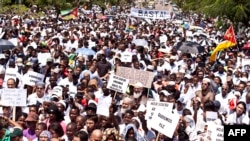JOHANNESBURG —
Mozambique was, until recently, considered a rising star in Africa, and was on an upward trajectory after the discovery of natural gas. But recent spurts of violence between government forces and former rebels have shaken that course. Can Mozambique get back on track as local elections approach later this month?
Mozambique is preparing to hold municipal elections on November 20, an event that has been overshadowed by a recent but limited outbreak of violence.
Mozambique has been piecing itself together since the end of a brutal 15-year civil war in 1992. Since then, it has written a constitution and held several elections. The popular tourist country has gotten another economic boost recently with the discovery of massive repositories of liquefied natural gas.
It is a promising future, says researcher Paulo Wache, that all Mozambicans want to see -- and one that he thinks they will.
Wache, a lecturer at the Center of Strategic and International Studies in Mozambique’s capital, says he believes the recent episodes of violence in the central part of the country are not likely to affect the entire nation.
“I think the conflict in Mozambique up to now is confined, and I don’t think that it will cover all the country due to the logistics for Renamo, but also because the government is sending the soldiers and police to contain this," said Wache. "And also because strategically Renamo may not be ready and willing to cover the entire country, even to attack the strategic points. That’s why they only attacked the road and some local [points] where there are soldiers or population, but they don’t attack the strategic places.”
Fighting erupted in October between government forces and members of Renamo, a former rebel group. Renamo had announced days before that it was withdrawing from a 1992 peace deal with the ruling Frelimo party.
Renamo has long expressed frustration at being an opposition party. The former anti-communist rebel group has claimed that Frelimo has rigged elections and has marginalized the opposition.
Wache says he believes that that disagreement will not overshadow the November 20 vote, which is going to be conducted in a few dozen municipalities, and not directly in the conflict area.
However, he says, if the fighting continues, it will pose a challenge for national elections in 2014.
“I think that elections won’t take place if the conflict continues," said Wache. "But I do believe that after these elections in November, the municipal elections, both sides will fight to find solutions and then to make it possible for the next election in 2014.”
Other analysts agree that a return to war is not likely due to how much has changed in the country in 21 years. They note the campaigning for local elections has been without incident.
Wache expects even tourism will not be affected as the country approaches the traditional summer holiday season.
Mozambique is preparing to hold municipal elections on November 20, an event that has been overshadowed by a recent but limited outbreak of violence.
Mozambique has been piecing itself together since the end of a brutal 15-year civil war in 1992. Since then, it has written a constitution and held several elections. The popular tourist country has gotten another economic boost recently with the discovery of massive repositories of liquefied natural gas.
It is a promising future, says researcher Paulo Wache, that all Mozambicans want to see -- and one that he thinks they will.
Wache, a lecturer at the Center of Strategic and International Studies in Mozambique’s capital, says he believes the recent episodes of violence in the central part of the country are not likely to affect the entire nation.
“I think the conflict in Mozambique up to now is confined, and I don’t think that it will cover all the country due to the logistics for Renamo, but also because the government is sending the soldiers and police to contain this," said Wache. "And also because strategically Renamo may not be ready and willing to cover the entire country, even to attack the strategic points. That’s why they only attacked the road and some local [points] where there are soldiers or population, but they don’t attack the strategic places.”
Fighting erupted in October between government forces and members of Renamo, a former rebel group. Renamo had announced days before that it was withdrawing from a 1992 peace deal with the ruling Frelimo party.
Renamo has long expressed frustration at being an opposition party. The former anti-communist rebel group has claimed that Frelimo has rigged elections and has marginalized the opposition.
Wache says he believes that that disagreement will not overshadow the November 20 vote, which is going to be conducted in a few dozen municipalities, and not directly in the conflict area.
However, he says, if the fighting continues, it will pose a challenge for national elections in 2014.
“I think that elections won’t take place if the conflict continues," said Wache. "But I do believe that after these elections in November, the municipal elections, both sides will fight to find solutions and then to make it possible for the next election in 2014.”
Other analysts agree that a return to war is not likely due to how much has changed in the country in 21 years. They note the campaigning for local elections has been without incident.
Wache expects even tourism will not be affected as the country approaches the traditional summer holiday season.




